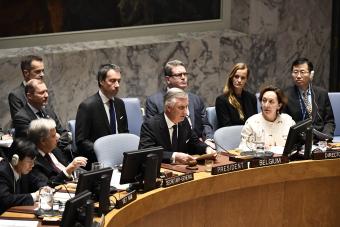Address by His Majesty the King of the Belgians at the United Nations Security Council meeting on children and armed conflict, New York

Mr. Secretary General,
Ladies and Gentlemen,
Thirty years ago, King Baudouin addressed Heads of State and Government who had gathered, here in New York, to mark the entry into force of the Convention on the Rights of the Child. He reiterated the importance of making governments and public opinion aware of children’s fragility and the importance of their family environment.
Since then, the United Nations has made extraordinary progress in championing the cause of children caught up in armed conflict. Belgium has made this a permanent priority of its foreign policy. Queen Mathilde has been involved in this issue for many years. It remains a burning topic, at a time when geopolitical tensions are at their highest since the start of the century.
Today, one in five children around the world suffers the adverse impacts of armed conflict. This figure must not leave us indifferent. For it represents real girls and boys, fleeing fighting, maimed, exploited, killed, sexually abused or recruited by armed groups. It reflects millions of young lives left wounded, in their bodies and in their minds.
Saving these children demands unflinching political will, joint prevention and remediation efforts, and constant mobilization of financial and human resources.
We must help these children to recover and to flourish. We must give them hope, and help them regain confidence in life. By listening to them, by recognizing their suffering, by reintegrating them into society and giving them ongoing support. That is how we will break the cycle of violence and make lasting peace possible.
In 1999, the Security Council adopted the first resolution on children in armed conflict. Ever since, the Council has continued to call for peace processes to incorporate, from the outset, essential elements to ensure the protection of children’s rights.
In various peace negotiations, there has been a real focus on protecting children. We should be proud of that fact. But inclusive processes remain exceptions to the rule. All too often, the plight of children remains overlooked. Their voices, rights and needs are barely taken into account. We have to do much better. The future of societies affected by hostilities is at stake.
We know from experience that parties to conflict can sometimes agree more easily on measures for children than on other issues. This consideration for children can build trust. An agreement intended to protect children can serve as a springboard and catalyst for broader agreements.
It is on the basis of this realization that guidance has been developed on the protection of children in peace negotiations and processes. Incorporating that guidance into peace negotiations will bring about a tangible improvement in the situations of child victims of conflict.
Ladies and Gentlemen,
Belgium remains deeply committed to multilateralism and to the United Nations. My country is fully committed, aiming to defend not its own interests, but the universal values that underpin the Charter and that are the foundation of every decent society.
This sincere conviction is reflected in our contribution to the functioning of the United Nations, in the deployment of Belgian soldiers in peacekeeping operations and in our investment in UN bodies, including the Security Council. It is reflected, too, in the concern that brings us together today.
Ladies and Gentlemen,
Every child has the right to grow up in a safe home, a secure environment, and to receive quality education. Every time we save a child from war, every time we help him to rebuild his life, every time we give him back a school, we make it possible for him to dream again. It is a victory for life. It is a reconciliation that we facilitate and maybe a new conflict we prevent. This is our joint responsibility.
The year 2019 marked the end of a disheartening decade for children in conflict zones. It is up to us to act - together and without delay - to ensure that the year 2020 is the start of a decade of hope for all children.
